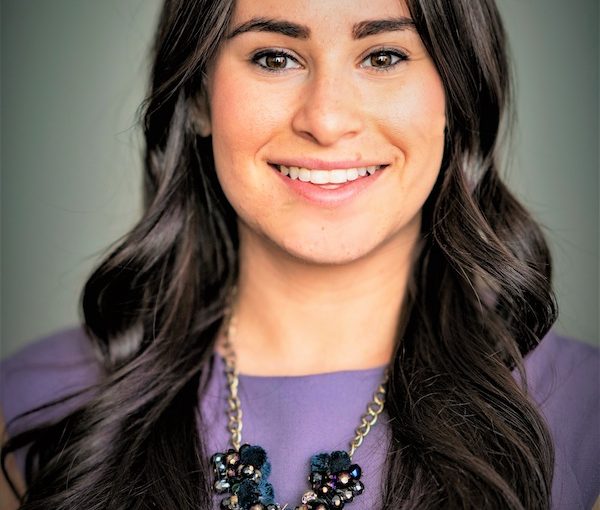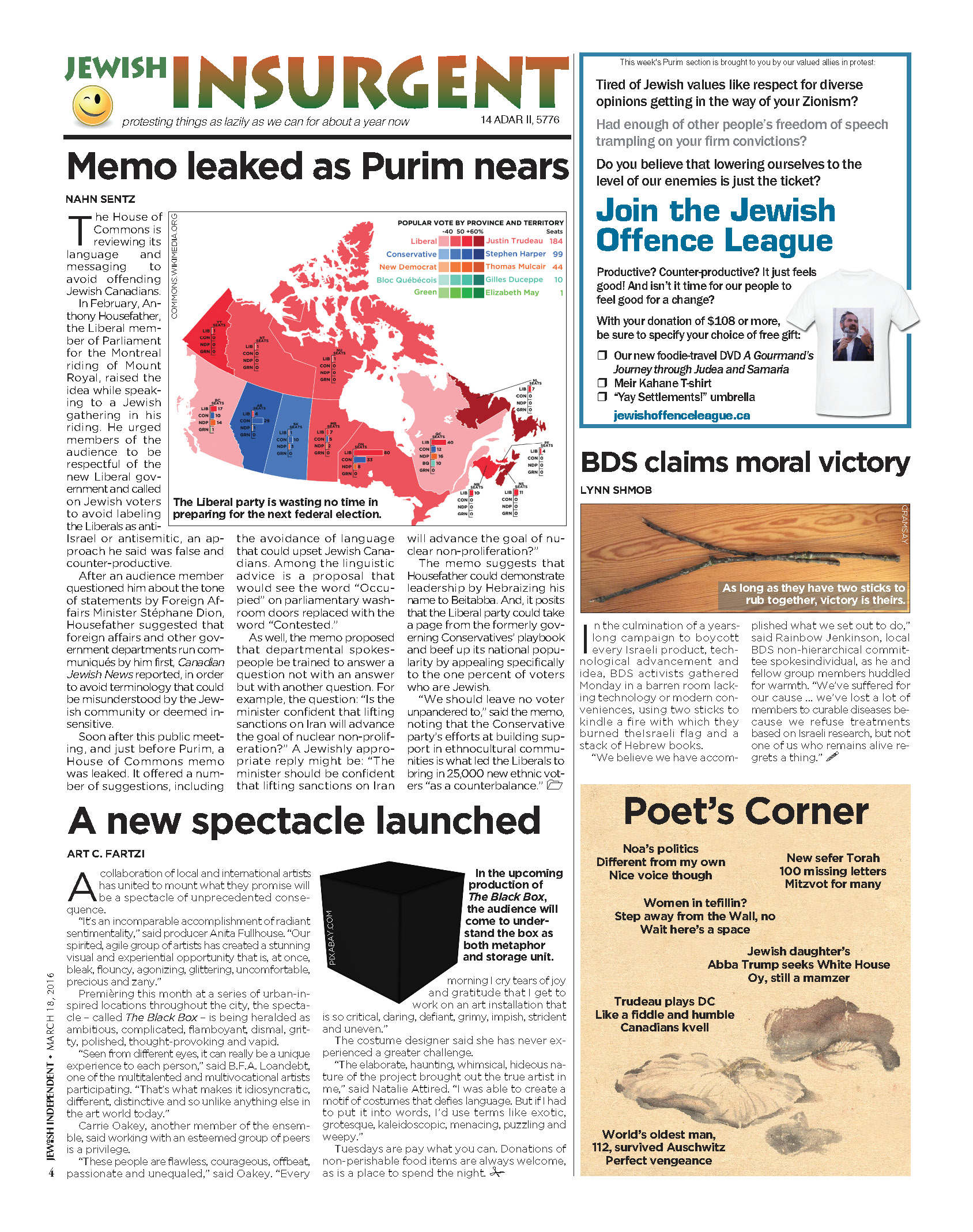New Canadian MPs, clockwise from top left: Jim Carr, Michael Levitt, Karina Gould, Anthony Housefather, Julie Dabrusin and David Graham. (photos from cjnews.com)
The Liberal tide that swept away the Conservative government of Stephen Harper brought in what is believed to be a record six MPs of Jewish lineage – one of whom was appointed to cabinet.
Winnipeg South Centre MP Jim Carr was named minister of natural resources and will have responsibility for overseeing hot-button issues such as the Keystone XL pipeline, as well as Northern Gateway, which the Liberals opposed prior to the election, and Energy East.
Carr, 64, is a former provincial politician in Manitoba and served as president of the Business Council of Manitoba. He was also a founding board member of the Canada West Foundation, a public policy and research nongovernmental organization.
Of the incoming MPs, two hail from Quebec, three reside in and around Toronto, while Carr is the sole Westerner.
At the same time, a handful of prominent Jewish MPs departed the scene. Longtime Mount Royal Liberal MP Irwin Cotler, who served as justice minister and attorney general in earlier Liberal governments, announced his retirement prior to the election. He was first elected in the Montreal riding in 1999.
Conservative MP Joe Oliver, who served as finance minister in the outgoing government – the first Jew to ever hold the position – was defeated in Eglinton-Lawrence, while his Tory colleague, Mark Adler, was similarly ousted in York Centre. Both ridings run along Toronto’s Bathurst Street corridor and are home to thousands of Jewish voters.
In interviews with the CJN, the incoming MPs described their background, their ties to the Jewish community and how their Jewish heritage and being the children or grandchildren of immigrants helped inform their political views.
***
Jim Carr is well aware of the immigrant experience. His family’s experience in Canada dates back to czarist times. Carr is the grandson of immigrants who fled Russian pogroms in 1906.
“They came with nothing – no skills, no money – just a thirst for freedom for their children and grandchildren,” he said in an interview prior to being selected to cabinet.
Carr grew up in a middle-class household in the River Heights neighborhood of Winnipeg. He had his bar mitzvah in 1964 at Congregation Shaarey Zedek.
“I’ve been part of the community all my life,” he said.
He’s also had a rather eclectic career, playing oboe in the Winnipeg Symphony Orchestra, working as a journalist for the Winnipeg Free Press and the CBC, and he was the founding chief executive officer of the Business Council of Manitoba. He also served in the provincial legislature as a critic in the areas of energy, education, urban affairs and constitutional matters.
Outside of politics, he was a founding member of Arab-Jewish Dialogue of Winnipeg, and he calls himself, “a passionate supporter of the state of Israel, which I have visited many times.”
Those life experiences shaped the values that he will bring to Ottawa.
“I can’t separate my values and political views from my identity as a Canadian and as a member of the Jewish community,” he said.
***
Michael Levitt had a traditional Jewish upbringing, just not in a traditional Jewish setting. The incoming MP for York Centre, Levitt attended synagogue and participated in youth groups in his native Scotland, where the Jewish community was small, tight-knit and traditional. It wasn’t until his family moved to Canada when he was a teenager that he was able to partake in the full array of communal activities.
And partake he did. His resumé listing his involvement in things Jewish is extensive. Among the most impactful was his participation in a leadership training program under the auspices of the United Jewish Appeal. “I found it absolutely fascinating,” he said.
He went on to serve as chair of the young adult division of the United Jewish Appeal and assisted in the UJA fundraising campaign, which raises money for a variety of Jewish agencies and for Israel.
He is a founding member of the Canadian Jewish Political Affairs Committee and he co-chaired Liberal Friends of Israel.
For Levitt, a partner and vice-president of business development for the Benjamin Group in Toronto, his Jewish heritage “absolutely” shaped the values he brings with him to Ottawa. Imbued with the spirit of tikkun olam, or repairing the world, he has particular empathy for seniors on fixed incomes, refugees and young people looking for jobs.
Levitt has visited Israel three times in recent years and expects his knowledge of the country will put him in a good position to inform his caucus colleagues about the challenges it faces.
***
Karina Gould calls herself “a fresh voice for Burlington,” her hometown. Although she is “not an active practitioner of Judaism,” she maintains her heritage through the celebration of Chanukah, Purim and Yom Kippur.
Gould is Jewish on her father’s side. Her paternal grandparents were Holocaust survivors from Czechoslovakia. Her grandfather was deported to Theresienstadt, then to Dachau and Auschwitz. Though separated during the war, her paternal grandparents were reunited afterward.
Her father met her mother, who is from Germany, while both were in Israel volunteering on Kibbutz Naot, where the sandals are made. While in Israel, her father visited her grandfather’s lifelong friend, a man who had been left for dead in a pile of corpses, but who had been rescued by her grandfather.
Gould visited Israel on a Birthright trip and stayed longer for a personal visit. Although she doesn’t consider herself a Zionist – “it’s not something that I thought about” – Gould admires the Jewish state.
“Israel is a beautiful country. It’s unique in the world. It has difficult challenges.” She particularly admires the country’s diversity and hopes for a solution that will allow it to peacefully coexist with its neighbors.
Gould believes her family heritage plays a big role in shaping her political values. “My family was accepted and welcomed into Canada after a difficult experience,” she said. “Canadian values of tolerance and diversity were not just important for my family, but for others. Canada provided the opportunity to grow and to thrive.”
***
Before incoming Jewish MPs can play Jewish geography with their colleague David Graham, they might well be better off studying the science of geography, as in maps and charts. That way they’ll be able to find the riding the Quebec MP represents. Graham was elected to represent Laurentides-Labelle, northwest of Montreal in the middle of cottage country and en route to the skiing venue Mont-Tremblant.
His family has lived in small-town Quebec for many years, he said, and his grandmother was an Olympic-level skier in her day. His great-grandfather, Hersh Wolofsky (Wolowski), was founder of Keneder Adler, a Yiddish-language newspaper that served the largely Jewish immigrant population of Montreal in the early 1900s.
Graham, 34, attended weekend Hebrew school as a young boy and today considers himself “a Reconstructionist Jew … culturally very Jewish.”
“I happen to be a Jew who happens to be in politics,” he said. “Jewish culture is a very community-oriented culture by nature. It had an enormous impact on my values,” he said, with the feeling that “community comes first.”
That has led him to champion a number of community initiatives, from promoting free software and calling for better public transportation.
Advocating for his community will be job one when he gets to Ottawa, he said. “My priority is my community.”
Laurentides-Labelle is “a poor riding” with an older population that lacks internet and cellphone connectivity, he said. Getting government to provide infrastructure support is necessary for the future of the area. “How are you going to keep youth if they can’t get the internet?” Graham asked.
As for the Middle East, he said, “I absolutely believe in Israel’s right to exist,” adding that the region is a very complicated place and he would defer to the government leadership in crafting policy in the area. “I have great faith that [Prime Minister] Justin Trudeau knows who to turn to for the best advice.”
***
Julie Dabrusin grew up in Montreal, but moved to Toronto to attend law school. She met a guy, got married and never moved back. Today, she lives in the Danforth area of Toronto and will represent Toronto-Danforth in Parliament.
Growing up, she attended Hebrew school regularly and remembers it as “an important part of my week.”
Her Jewish identity is an important part of her life, as is her feeling of being part of a larger multicultural community.
“What I take from my Jewish background is a lot of study and learning, debate and advocacy,” she said. “That ties into being involved in politics.”
Dabrusin has visited Israel twice, first as part of a CEGEP (a publicly funded post-secondary, pre-university college) program that included volunteer work on a kibbutz and, later, while attending McGill University, on an archeological dig that unearthed a Byzantine church.
“Israel is a beautiful country with a strong and resilient population…. As a mother [of two], I understand Israelis wanting to be safe and secure,” she said.
***
The origins of the family name Housefather are lost in the mists of time but, according to family lore, there was probably an innkeeper or someone who ran an orphanage somewhere in Bukovina, Romania, who adopted the name, or at least the pre-anglicized version of it. But that connection to the Austro-Hungarian Empire is way in the past – all of Anthony Housefather’s grandparents were born in Montreal, as was he. Housefather, who has served as mayor of Cote-St.-Luc since 2005, was recently elected MP in the Liberal bastion of Mount Royal, the seat vacated by Irwin Cotler. The riding has a higher proportion of Jews than any in Canada, he said.
Like his predecessor, Housefather has substantial links to the Jewish community. He attended Herzliah High School and is fluent in Hebrew. He served on the executive of Canadian Jewish Congress’ Quebec region and was part of a group tasked with finding ways to retain young Jewish Montrealers who were leaving for greener pastures.
He also has longstanding ties to the Maccabi movement, with his first exposure to the Jewish sports organization as a teenager attending youth games in Memphis. At the 2013 Maccabiah Games in Israel, he won seven medals, two silver and five bronze, in a variety of masters swimming events.
“Being involved in the community, Jewish and non-Jewish, is an important part of our [family] values,” he said.
Given his role in local government, he sees himself as an advocate for municipal interests at the federal level.
He also considers himself as someone who will speak up for the Jewish community and reflect their concerns over the well-being of the state of Israel.
“I’m passionate about the state of Israel, and I certainly [understand] the security issues [it] faces, given its borders and the narrowness of the country…. I’m pretty well attuned to the policy issues on Israel. We committed in the election that we’d have Israel’s back, and support for Israel is a Canadian value,” he said.
– For more national Jewish news, visit cjnews.com.







